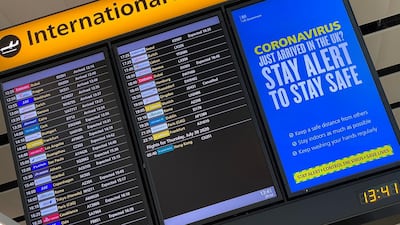British tourism bosses and the government are at loggerheads over the best way to revive the travel industry amid calls for air passengers to pay for coronavirus tests at airports.
John Holland-Kaye, the chief executive at Britain’s biggest and, usually, Europe’s busiest airport, said that without Covid-19 testing the UK was playing “quarantine roulette”.
But Culture Secretary Oliver Dowden said airport testing was not a “silver bullet” to save the industry.
Britain’s tourism sector, like other parts of the national and global economy, is suffering after coronavirus lockdowns, social distancing orders and a fast-changing list of destinations considered safe.
British Airways, Ryanair and easyJet have all offered cut-price deals to try to woo consumers back on to planes.
Meanwhile, travel company TUI cancelled holidays to Spain’s Balearic and Canary Islands until August 4 after the UK updated with little warning its advice against non-essential travel to Spain to include its southern island groups.
“The UK needs a passenger-testing regime and fast. Without it, Britain is just playing a game of quarantine roulette," Mr Holland-Kaye said.
"We are an island nation – we cannot cut ourselves off from the world for the foreseeable future. We've got to find a way of keeping people safe from a second wave but also getting the economy going again."
He told the BBC that travellers should be expected to pay for the £150 (Dh710) coronavirus test, and that it would help Britain’s aviation sector, which has already announced 20,000 job cuts.
He did not offer evidence to show that potential passengers would be willing to pay the extra money for a holiday that could be cancelled if travel advice were updated, in the same way that the travel advice for mainland Spain changed without warning last weekend.
Heathrow management said the airport had recorded a pre-tax loss of £1.1 billion in the first six months of the year, and that revenue halved year-on-year while passenger numbers dropped 96 per cent in the second quarter.”
"Today's results should serve as a clarion call for the government,” Mr Holland-Kaye said.
"Testing offers a way to safely open up travel and trade to some of the UK's biggest markets, which currently remain closed," he added.
Mr Dowden said further travel restrictions could be expected.
“We are reviewing all options because what we want to do is to minimise the disruption and I fully appreciate and share people’s concern about that disruption. I have to just caution in respect to testing. It is not the case that testing provides a silver bullet,” Mr Dowden said.
"It would be foolhardy of the government not to impose those restrictions if we think there is a risk, and we will impose those restrictions as soon as we think the risk has materialised."










